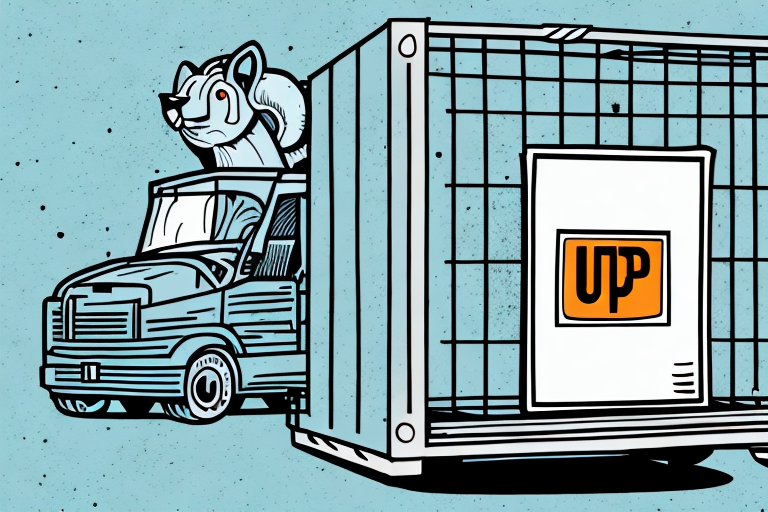Understanding FedEx Animal Shipping Rates
Shipping animals with FedEx involves various factors that influence the overall cost. This comprehensive guide explores FedEx's animal shipping rates, detailing why they differ from regular shipping rates, outlining FedEx's shipping policies and regulations, providing steps to prepare your animal for shipping, identifying the types of animals eligible for shipment, and offering essential tips for ensuring the safe transportation of your pets.
Why Animal Shipping Rates Differ from Regular Shipping Rates
Additional Resources and Care
Animal shipments require specialized handling compared to standard packages. FedEx allocates extra resources, including trained staff, dedicated time, and specialized equipment, to ensure the safety and well-being of animals during transit. This heightened level of care contributes to the higher shipping rates.
Temperature Control and Specialized Equipment
Maintaining appropriate temperature and ventilation is crucial for animal shipments. FedEx utilizes specialized containers and vehicles equipped to provide the necessary environmental conditions, which adds to the overall cost. Additionally, specific animals may require unique handling or feeding instructions, further increasing shipping expenses.
FedEx Animal Shipping Policies and Regulations
Shipping Guidelines and Acceptance
FedEx has strict policies to ensure the safe transportation of animals. Live animals are accepted only during certain times of the year and to specific destinations, depending on the species and other factors. It's essential to review and comply with all FedEx animal shipping policies to prevent delays or issues.
For detailed guidelines, refer to FedEx's official animal shipping page.
Packaging and Labeling Requirements
Proper packaging is vital for the safe shipment of animals. Containers must be sturdy, secure, and provide adequate ventilation and space for movement. Labels should clearly state the type of animal, its scientific name, and any special handling instructions. Non-compliance can lead to shipment refusal or harm to the animal.
Preparing Your Animal for Shipping
Health and Vaccinations
Ensure that your animal is in good health and up-to-date with all necessary vaccinations. A recent health certificate from a veterinarian may be required, especially for international shipments.
Crate and Carrier Preparation
Select a comfortable and appropriately sized crate or carrier. Familiarize your pet with the carrier prior to shipping to reduce stress. Include necessary supplies such as food, water, and any required medications.
Adjusting to Travel
Modify your animal's diet or exercise routine in the days leading up to the shipment to ensure they are comfortable and reduce the risk of travel-related issues.
Types of Animals Eligible for Shipping
Common Household Pets
FedEx accommodates various household pets, including dogs, cats, birds, and small mammals. Each species may have specific requirements, so it's important to review FedEx's guidelines accordingly.
Exotic and Specialized Animals
Exotic animals such as reptiles, amphibians, and certain bird species can also be shipped, provided all regulatory requirements are met. Specialized equipment and handling procedures are necessary to ensure their safe transit.
Note that FedEx does not support shipping live animals intended for slaughter. Always verify the latest policies on FedEx's animal shipping resource center.
Factors Affecting the Cost of Animal Shipping Rates
Weight, Size, and Destination
The weight and size of the animal, along with the shipping destination, significantly influence the cost. Longer distances and international shipments typically incur higher fees due to increased transportation challenges.
Mode of Transportation
Air transportation is generally more expensive than ground transportation due to the speed and specialized handling required. The choice between these modes affects the overall shipping rate.
Permits and Certifications
Certain animals require specific permits or health certifications, especially for international shipments. Obtaining these documents can add to the shipping cost.
Insurance and Additional Services
Opting for insurance coverage or additional services such as tracking can enhance the safety of the shipment but will also increase the total cost.
For more insights on shipping costs, see the American Pet Insurance guide on transportation costs.
Tips for Safely Shipping Animals with FedEx
Proper Identification and Comfort
Ensure the carrier is clearly labeled with your pet's identification details. Provide comfortable bedding and familiar items to help reduce stress during transit.
Regulatory Compliance
Research and adhere to all regulations regarding animal shipments, including necessary vaccinations and health certificates. Compliance prevents legal issues and ensures the animal's safety.
Minimizing Transit Time
Arrange pick-up and drop-off times that minimize the time your pet spends in transit. Reducing transit duration can alleviate stress and discomfort for your animal.
Insurance and Handling Injuries During Shipment
Insurance Options
FedEx offers insurance for animal shipments, providing coverage in case of loss or damage. Evaluate the insurance options to select coverage that matches the value and needs of your animal.
Review the available options on FedEx's insurance page for detailed information.
Handling Injuries and Claims
If your animal is injured during shipment, contact FedEx's customer service immediately. Document the injury with photos and written descriptions, and follow the claims process as outlined in your insurance policy.
Having comprehensive records and timely communication can facilitate a smoother claims process and ensure your animal receives the necessary care.
Choosing the Right Carrier for Your Animal Shipment
Selecting a reliable carrier is essential for the safe transportation of your animal. FedEx is renowned for its animal shipping services, offering specialized handling and dedicated support. Compare FedEx's offerings with other carriers to ensure you select the best option that meets your specific requirements.
For comparisons, refer to resources like the PetTravel carrier guide.
Navigating International Animal Shipping with FedEx
Understanding International Regulations
International shipments involve additional regulations, including import/export permits, quarantine requirements, and health certifications. Familiarize yourself with the destination country's regulations to ensure compliance.
Documentation and Procedures
Prepare all necessary documentation in advance to avoid delays. Work closely with FedEx representatives to navigate the complexities of international shipping smoothly.
Consult the FedEx international shipping guide for detailed procedures.
Real-Life Examples of Successful Animal Shipments with FedEx
FedEx has facilitated countless successful animal shipments, ranging from household pets to exotic species. These real-life examples demonstrate FedEx's capability to handle diverse shipping needs effectively.
For testimonials and case studies, visit FedEx's customer support section.
Common Misconceptions About Shipping Animals with FedEx
Safety and Humane Transportation
One common misconception is that shipping animals via air is unsafe or inhumane. In reality, FedEx employs rigorous safety protocols and standards to ensure the well-being of animals during transit.
Limitations on Animal Types
Another misconception is that FedEx only ships certain types of animals. FedEx accommodates a wide range of animals, provided all regulatory and policy requirements are met.
For accurate information, refer to FedEx's animal shipping policies.
The Future of Animal Shipping and What It Means for Customers
Advancements in technology and transportation are continually enhancing animal shipping services. Future developments may include improved temperature control systems, real-time tracking, and more personalized care options.
Staying informed about these trends will help customers make better-informed decisions and ensure the continued safety and comfort of their animals during shipping.
To keep up with the latest updates, regularly check FedEx's newsroom and industry publications.






















